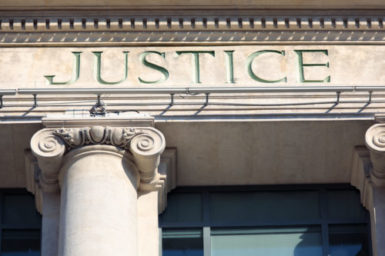
ב''ה
 Subscribe to our
Subscribe to ourQuestion 1: I have a question about the idea of ordaining someone as a “Noahide Judge” (“Dayan” in Hebrew). This would imply that the person is being certified and authorized to serve as a judge presiding over a court. Who has authority to validly bestow such ordinations?
Question 2: Can there be such a thing a “Noahide Court” in the present condition of the world?
Answer 1: First of all, I think it’s wonderful that faithful Noahides study the Torah laws of the Noahide Code. They have the possibility to become Torah scholars in the details of their Seven Commandments. This makes them worthy of honor as a Jewish High Priest (Kohen Gadol) who served in the Holy Temple. We find this stated in Tractate Sanhedrin 59a.
However, within the Torah laws for the Noahide commandment of Dinim (establishment of laws and courts), it seems that such an idea – to offer a program for Gentiles that results in their ordination as “Noahide Judges” – could only be valid if it is implemented within the established legal system of a society’s ruling government. (See also the video by Rabbi Moshe Weiner at the end of this article.)

This can be learned from the following excerpts from Sheva Mitzvot HaShem, Part VIII, Chapter 2, by Rabbi Moshe Weiner. (“Appointment of Judges and Enforcement Officers, and the Qualifications Necessary to be a Judge”.) The selected excerpts are relevant to the topic of ordination and appointment of Noahide Judges. The footnotes added by the Director of Ask Noah International are indicated by the symbol “ * ”.
1. Every nation and government is obligated[1] to appoint[2] judges and law-enforcement officers who are worthy of those positions. Those government-appointed people[3] are the ones who should be authorized to judge and to enforce.
[1] *The government should have a system in place for educating, training and ordination of their judges. There should also be a system for training of the officers.
[2] *The government’s process for appointing judges is understood to include its process for ordaining people as judges. Therefore, everywhere that “appointing” is mentioned in these Torah laws, ordination is also included.
[3] *The judges and officers should only be those who are placed in those positions by the ruling government. This is done through its established legal system.
In contrast, it is not possible for an individual person to appoint himself to judge or enforce laws upon others. This would result in chaos and confusion.[4]
[4] *Therefore, a person who does this is a transgressor. He should be reprimanded and removed from his self-appointed position.
It is likewise not possible for an individual person to appoint himself as an ordainer and appointer of Gentile judges or officers for courts which judge Gentiles according to their Torah-based and/or secular laws. Rather, within the Noahide commandment for Dinim, that is an obligation which rests upon the society. Therefore, it rests upon the ruling government, as stated at the outset in this topic.
As a corollary, we note that there is no chain of Torah-based or Rabbinical semichah (ordination) for Gentile judges. Therefore, a Rabbi or Noahide judge can’t validly ordain a Gentile as a judge independently from the society’s legal system.
[…] It is forbidden to appoint a judge who is not understanding and expert in the ways of the laws.[5] This applies even if he will ask another judge or a legal scholar what his legal rulings should be.
[5] *See The Divine Code, 4th ed., Part VIII, topic 1:4. An empowered Noahide court requires authorization by the ruling government and acceptance by the majority of the society. A Noahide judge for such a court must be expert in judging according to two legal systems.
(1) The Torah laws of the Noahide commandments, referred to as the “fixed laws” which are commanded by G-d.
(2) The secular laws of the government and its justice system, referred to as the “resolved laws”.
Therefore, if the government or the majority of the society has not authorized courts to judge on the basis the Torah law for Gentiles, the requirement for the Gentile judges (whether or not they are personally observant of the Noahide commandments) is to judge on the basis of the secular laws of their particular nation. It follows that in all cases and situations, in order to be ordained or appointed as a judge for Gentiles, a person must be expert at least in the secular laws of the particular land in which he is being authorized to serve as judge.
[Additional points: (a) From this it follows that if one nation’s government appoints a judge for their legal system, that in itself does not confer permission for him to serve as a judge in another nation’s legal system; (b) What if a case arises in which the secular law requires a ruling in violation of a Noahide Commandment? The judge should recuse himself from the case.]
Needless to say, it is forbidden to appoint a judge because of money that is given to appoint him.
7. […] It is not appropriate to appoint a judge who is not from the people who will be under his jurisdiction. This would make him less acceptable to the people.[6]
[6] See Rambam Laws of Kings 10:11 and Radvaz there. As the first preference [in the Land of Israel in a time when the Yovel (Jubilee) years can be observed], we [the ruling Jewish courts] appoint judges for the Ger Toshav Gentiles, from among them [those Gentiles]. Only when the ruling Jewish court sees that it is better for the Ger Toshav Gentiles if they will be judged by Jewish judges, do they appoint judges for them from among the Jews.
*Note here that Rambam and Radvaz speak about the ruling Jewish court being the appointer of judges over Gentiles. That applies for Ger Toshav Gentiles residing in the Land of Israel and under the authority of a Jewish government. Rabbinical commentaries on this explain that this is justified because in that situation, the Jews are obligated to provide support to the Ger Toshav Gentiles if they are in need of help.
The Jewish court in Israel doesn’t have an obligation to provide support to the general Gentile populations in other countries. Therefore, their judges should be appointed by their governments which do have that obligation, as stated in topic 1 above. Even for Ger Toshav Gentiles, their judges are not to be appointed by an individual who desires to do so. Their judges are appointed only by the ruling Jewish court.
9. A judge who took a bribe or purposefully perverted or falsified his ruling is disqualified from being a judge. Any legal judgment that he makes should not be accepted as the law. The society’s legal system[7] is obligated to remove him from his position as a judge. He should be prosecuted in court and punished for committing that crime.[8] […]
[7] *Just as the rescinding of a judge’s appointment is the exclusive responsibility of the government’s legal system, so too it is their exclusive responsibility to ordain and appoint judges for the courts in their nation.
[8] See also topic 3:7 in the Dinim section of Sheva Mitzvot HaShem (which is topic 2:7 in The Divine Code, 4th ed., Part VIII).
18. […] Gentiles are permitted to appoint a Jewish judge who will judge them in their Gentile court[9] (although this is not a proper appointment in the first place, for the reason given above in topic 7).
[9] It is necessary to examine the statement in Midrash Tanhuma on Deut. 16:18, “ ‘Judges and officers you shall make for yourselves in all your gates’ – make for yourselves [for the Jewish people], but not for nations of the world [umot ha’olam, which can also mean Gentiles in general].” There are varying Rabbinical explanations of the possible meaning of this statement.
It is possible that the intention of this Midrash is that there is no Scriptural commandment of the Torah for Jews to appoint judges and officers for Gentiles, and not even for Ger Toshav Gentiles in the Land of Israel. Rather, there is a command given through Moses for the Jewish people to compel [or at least to urge] all Gentiles to observe their Seven Commandments. Therefore, automatically, this includes compelling [or urging] them to appoint judges, and helping them [i.e. their governments] to do this for themselves.
19. It is included in the general commandment of Dinim which Gentiles are obligated in, that every court for Gentiles in every city shall appoint officers to enforce the rulings and judgments, because if there is no enforcement officer, the matter of judging has no value, and it will happen that righteous judgment will become null and void.[10] […]
[10] This point is explained in Midrash Tanhuma, in the beginning of its section on the Torah portion of Shoftim (which begins with Deut. 16:18).
*From this it follows that any attempt to ordain or appoint someone as a judge for a Gentile court has no value if there is no system in place to provide government-authorized officers under the authority of that judge. At best, such a person could only validly serve as an arbitrator or mediator between litigants outside of a court setting. Serving in that role does not require any judicial ordination. See The Divine Code, 4th Ed., Part VIII, topics 3:6-9.

An actual “Noahide Court” could be empowered (only by the government) if a majority of the people in the nation are observant of the Seven Noahide Commandments. No stable society with an established court system would turn its authority for judging felony crimes over to free-lance or vigilante courts. What is being described, therefore, is a court authorized and empowered by the government and the society – which according to the Torah law must include enforcement officers.
A Noahide Court would hold trials to convict and punish transgressors within the Torah laws of the Noahide Commandments. Note that capital punishment for murder is specified in Genesis 9:6: “Whoever sheds the blood of man, among [a court of] man, his blood shall be shed…” This refers to a Noahide commandment to judge and penalize a murderer.
What if the litigants in civil matters want a settlement based on the Torah laws of the Noahide Code? They have the option to submit to binding arbitration based on the rules of the Noahide Code. To do this in a way that’s consistent with the society’s ruling court system, they should consult with an attorney. He should be expert in the society’s civil laws governing arbitration and contracts.
By Dr. Michael Schulman
Director of Ask Noah International and Asknoah.org
For additional information and explanation about the Torah laws pertaining to these subjects, please see this video by Rabbi Moshe Weiner. His talk focuses on the Torah-based principles of the courts for Non-Jews:
Rabbi Moshe Weiner is the acclaimed author of Sheva Mitzvot HaShem , The Divine Code, and Seven Gates of Righteous Knowledge.